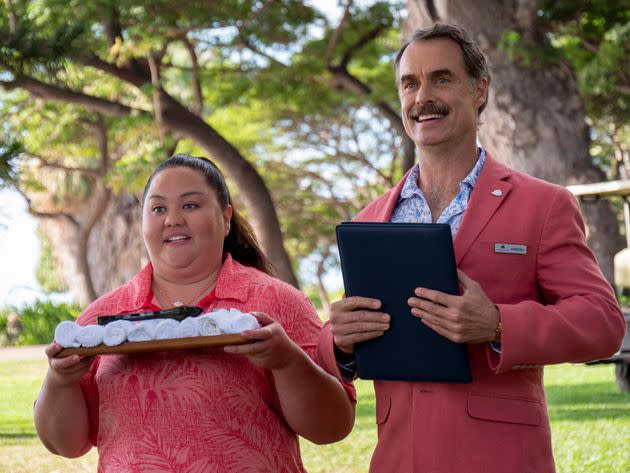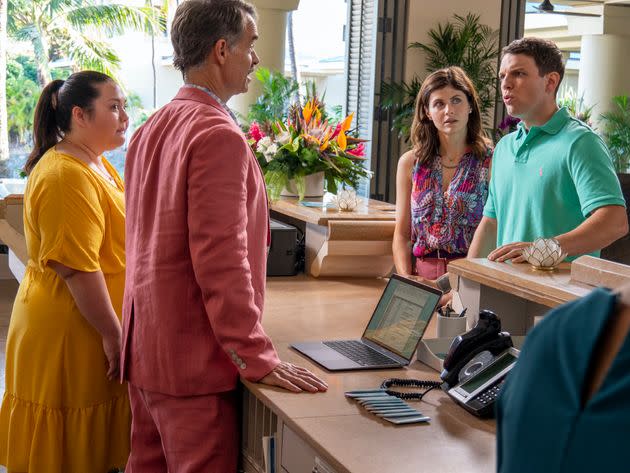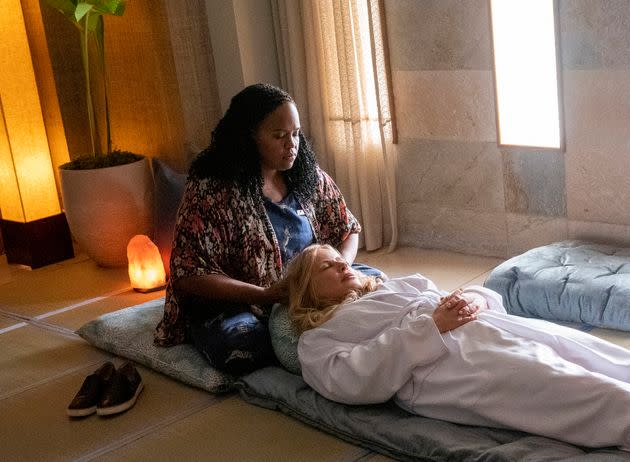'The White Lotus' Is A Stale Entry In The 'Shows About Rich White People Problems' Genre
“You have to treat these people like sensitive children,” Armond (Murray Bartlett) advises Lani (Jolene Purdy) on her first day of work at the White Lotus, a resort in Hawaii and the titular setting of HBO’s newest Sunday night limited series.
“The White Lotus” quickly establishes itself as a show in the “can you believe these rich white people and their petty problems?” genre. As soon as the moneyed vacationers arrive via yacht, the staff members at the White Lotus must tend to their guests’ various demands and complaints. They smooth over the many tensions that arise, smiling and waving while seething inside.
But three episodes into the six-episode limited series, the show’s treatment of “rich white people problems” feels stale and lukewarm. The absurdities and follies of the uber-wealthy and privileged are a plentiful well for pop culture. However, “The White Lotus” isn’t all that lacerating or distinctive when considering the volume of TV shows that have satirized or gazed critically at these kinds of characters, from “Arrested Development” to “Billions.” HBO has long been a home for some of the buzziest “rich white people problems” shows, like “Big Little Lies,” “The Undoing,” the new “Gossip Girl” reboot, and the best and most scathing of them all, “Succession,” which will finally return for its third season this fall. Its combination of savage wit, physical humor, eerie parallels to real life and characters out-maneuvering each other produces the perfect tragicomedy.

On “The White Lotus,” the tension is more atmospheric. The show’s hair-raising music and ominous “The Shining”-style shots of the resort’s long hallways suggest something sinister is afoot. The first episode begins in the future, at the end of the guests’ weeklong vacation, and lays the breadcrumbs for a whodunit mystery. It then flashes back to the beginning of the week, and we’re off to the races: Secrets about the characters are revealed, and shenanigans ensue. But much of it is well-trodden territory and not enough to draw you into the world of these characters and become invested in gawking at their absurdities and finding out what will happen to them next.
There are some moments of class critique, like in the marriage of Rachel (Alexandra Daddario) and Shane (Jake Lacy), who are honeymooning at the resort. Shane, who comes from family wealth, treats Rachel as his trophy wife and suggests she quit her job as a journalist. In addition to being disrespectful to Rachel, Shane spends much of their vacation hounding Armond for not securing them the resort’s most extravagant and capacious suite, among other complaints. Rachel, meanwhile, is having a lot of second thoughts about the marriage.

The “upstairs-downstairs” dynamic is also a fixture in pop culture, and “The White Lotus” misses an opportunity to tell the story from a more complete perspective. Other than with Armond, the resort’s manager, the show doesn’t really explore the backstories of the staff members, most of whom are people of color. And it gestures at, but doesn’t delve into, subjects like colonialism and the exploitation of native Hawaiians.
However, the show’s storylines that involve the staff are far more ripe for drama and tension than the ones that build out the intrigue surrounding the wealthy guests. Tanya (Jennifer Coolidge), who has come to Hawaii to grieve her late mother, becomes emotionally attached to the resort’s spa manager, Belinda (Natasha Rothwell). Tanya effusively compliments Belinda’s professionalism and skill, invites her to dinner and offers her money to start her own business. As a rich, white woman, Tanya probably thinks of all of this as well-meaning, but to Belinda and us viewers, it’s deeply uncomfortable.

Understandably, Belinda is unsure what to make of Tanya. But by the third episode, she starts to realize Tanya’s offer could be a way out of this thankless job. While getting out of her car for another day of work, she gets a phone call from her son, who laments that she is “never not at work.” He encourages her to take up Tanya’s offer because “that fucking place exploits you. If that lady says ‘jump,’ you say, ‘how high?’”
On the one hand, you could say it’s all part of the point, and the race and class inequities between the guests and the staff are already obvious. To the guests, the staff members are invisible and unimportant. The guests are too oblivious and out of touch to care about the people working around the clock to meet all of their inane demands, or consider the locale’s history and culture.
But why even tell this story primarily from the perspective of the rich, white guests? The brief moments that center the White Lotus’ staff point at a version of this show that could have been told from their perspective, instead of making them mostly secondary characters and plot devices. That would have made “The White Lotus” a more interesting and more fully realized show, and it would have added something new to the “rich white people problems” genre.
This article originally appeared on HuffPost and has been updated.

 Yahoo Finance
Yahoo Finance 



